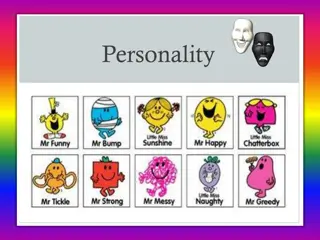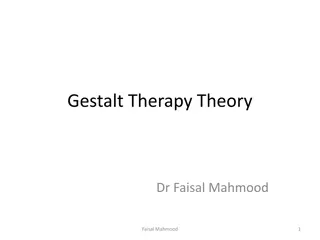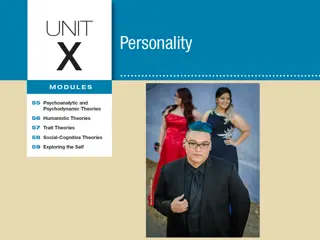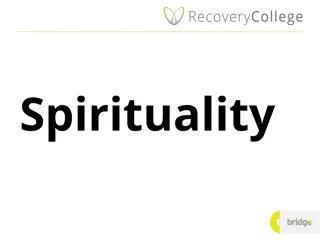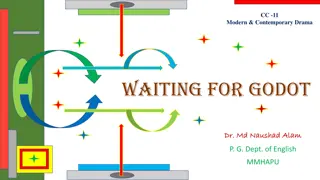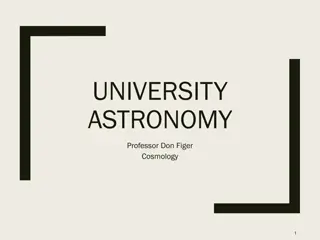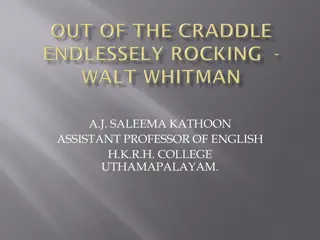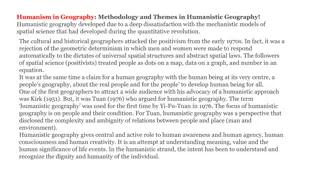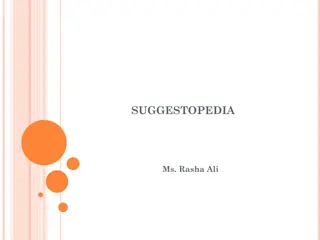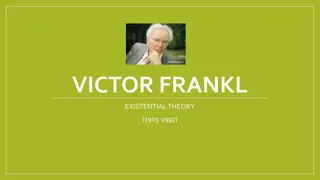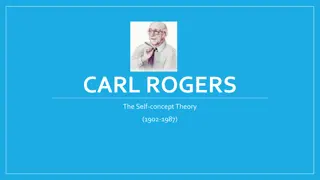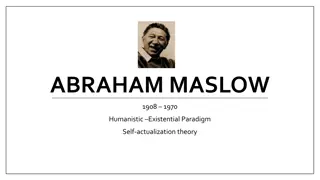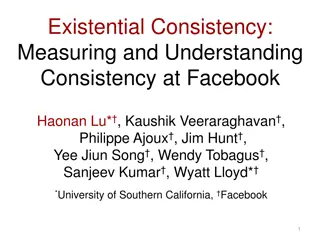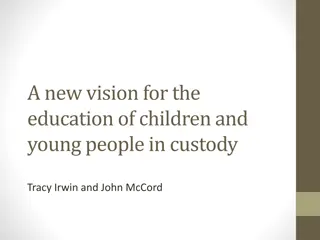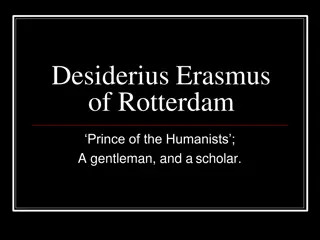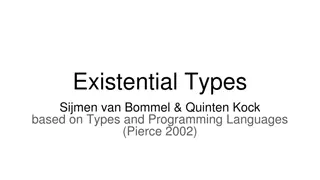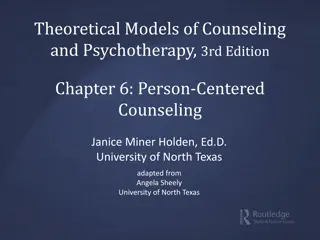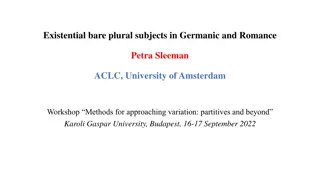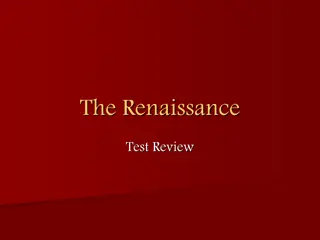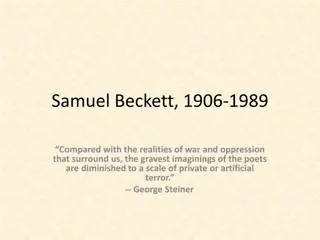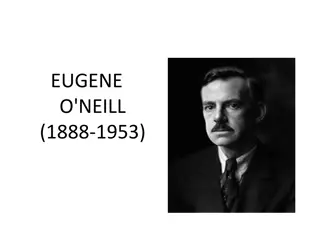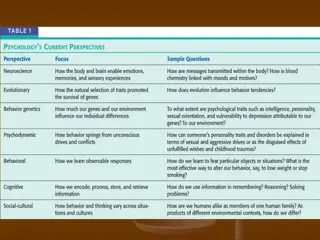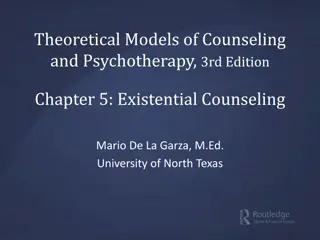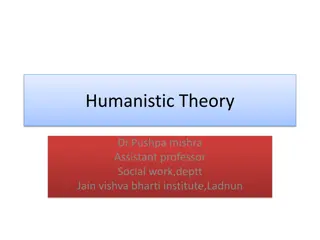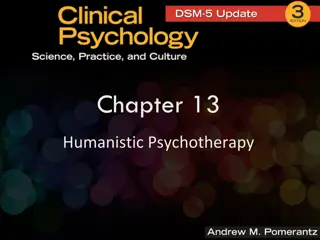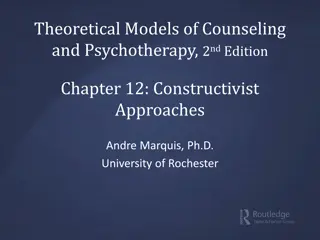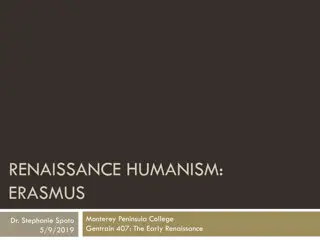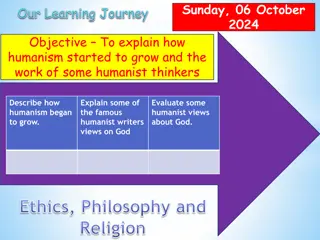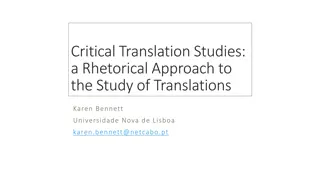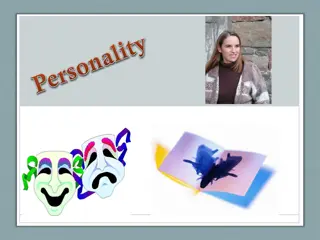Outcomes Research
Explore the definition and importance of outcomes research in managed care, including the tools used to measure clinical, economic, and humanistic outcomes. Discover the role of managed care pharmacists in outcomes research.
3 views • 20 slides
Understanding Personality: Theories, Types, and Assessment
Exploring the intricate world of personality, this comprehensive guide delves into major theories of personality development, assessment methods, cultural influences, and key contributors. Discover the different types of personalities, including Type A and Type B, and unravel the complexities of psy
0 views • 96 slides
Are you looking for Couples Counselling in Mount Martha?
Are you looking for Couples Counselling in Mount Martha? Welcome to Haven Counselling and Psychotherapy in Mornington. We are a team of counsellors and psychotherapists who are dedicated to helping you make the changes you need to live a more fulfilling and satisfying life. We aim to establish a saf
0 views • 6 slides
The Love Song of J. Alfred Prufrock by T.S. Eliot Summary
T.S. Eliot's 'The Love Song of J. Alfred Prufrock' sets a contemplative tone as the protagonist navigates streets filled with enigmatic imagery and self-reflection. The narrative delves into themes of indecision, the passage of time, and existential musings. The vivid descriptions paint a portrait o
2 views • 24 slides
Understanding Personality: Theories and Components Explained
Personality is the unique and enduring characteristics that define individuals, influencing their behavior consistently over time. Explore the origins of personality from the Latin word 'persona' meaning 'mask', and delve into major perspectives such as psychoanalytic, trait, humanistic, and social-
1 views • 45 slides
Understanding Gestalt Therapy Theory with Dr. Faisal Mahmood
Explore the basic concepts of Gestalt therapy theory with Dr. Faisal Mahmood. Delve into phenomenology, field theory, and dialogical relationship. Learn the holistic, process-oriented, and existential approach to human change focused on awareness and personal responsibility.
0 views • 101 slides
Understanding Maslow's Hierarchy of Needs in Humanistic Psychology
Humanistic psychologists, such as Abraham Maslow and Carl Rogers, viewed personality as a quest for self-determination and self-realization. Maslow's hierarchy of needs illustrates how individuals progress from fulfilling basic physiological needs to achieving self-actualization and self-transcenden
0 views • 25 slides
Exploring the Depth of Spirituality and Peak Experiences
Spirituality is a profound concept that gives meaning and purpose to life, transcending individual existence. It involves finding unity and harmony with others, nature, and a higher power, developing personal values and beliefs, seeking understanding of one's place in the universe, and embracing the
0 views • 12 slides
Understanding Samuel Beckett's Waiting for Godot: A Modernist Masterpiece
Samuel Beckett, a prominent modernist writer, crafted the groundbreaking play "Waiting for Godot" as a tragicomedy in a theater of the absurd. Set in a vague time and place, the play reflects the post-World War II disillusionment and existential themes. Beckett's experimental approach challenges tra
1 views • 16 slides
Understanding Transitivity System in Grammar
The transitivity system in grammar helps speakers and writers convey ideational meaning by encoding their experiences of the world around them through participants, processes, and circumstances. This system categorizes participants as animate or inanimate, processes as material, mental, relational,
1 views • 14 slides
Analysis of Walt Whitman's "Patrolling Barnegat
Walt Whitman's poem "Patrolling Barnegat" reflects the power of nature and the struggle of man against it. Set on a stormy night by the sea, the poem portrays vivid imagery with religious undertones, utilizing literary devices like alliteration and assonance to create a poignant reflection. Whitman'
0 views • 18 slides
Exploring Cosmology: A Journey Through the Universe's Mysteries
Delve into the fascinating field of cosmology with Professor Don Figer as he unravels the big bang theory, cosmological observations, and ponders the fate of the Universe. Learn about the origins of cosmology, its elements, history from Aristotle to Newton, and the evolution of our understanding of
0 views • 56 slides
Analysis of Walt Whitman's Poem "Out of the Cradle Endlessly Rocking
Walt Whitman's poem "Out of the Cradle Endlessly Rocking" explores themes of life, death, unity, and individuality through the speaker's childhood memories. The poem delves into the discovery of the secrets of life and death by the speaker as a child, focusing on a pair of birds and the male bird's
0 views • 22 slides
Humanism in Geography: Methodology and Themes
Humanistic geography emerged as a critique of mechanistic spatial models during the quantitative revolution, emphasizing human agency, consciousness, and creativity in understanding the complexities of human-place relationships. It rejects geometric determinism and celebrates individual dignity, pro
0 views • 4 slides
Understanding Suggestopedia: A Humanistic Approach to Language Learning
Suggestopedia, an affective-humanistic approach to language learning, aims to eliminate negative feelings towards studying and boost students' confidence. By incorporating elements like posters, encouraging interactions, music, and student participation, this method emphasizes the teacher's authorit
0 views • 9 slides
Victor Frankl's Existential Theory and Logotherapy
Victor Frankl, a prominent figure in existential psychology, developed the theory of logotherapy, emphasizing the pursuit of meaning as a primary motivator for human beings. He believed in the freedom to choose and take responsibility, transcending mere animal existence to live a meaningful life. Fr
0 views • 47 slides
Carl Rogers and the Self-Concept Theory
Carl Rogers, a prominent figure in personality theory, emphasized individuals' constructive potential and the impact of their subjective experiences on personality development. He viewed individuals as goal-directed and capable of change, with the environment playing a facilitating or inhibiting rol
1 views • 78 slides
Understanding Abraham Maslow's Humanistic Existential Paradigm
Explore the key concepts of Abraham Maslow's humanistic existential paradigm, including self-actualization theory, perspective, and views on need gratification. Learn about Maslow's belief in human potential, the motive for self-actualization, and the importance of need gratification in realizing in
1 views • 81 slides
Understanding Conflict Management: Key Perspectives and Approaches
Explore the multifaceted realm of conflict management through the lenses of traditional, humanistic, and interactionistic views. Delve into the definition, nature, and implications of conflict, and assess varying opinions on confrontation, communication, and resolution strategies within organization
0 views • 31 slides
Unveiling Positive Psychology: Shifting Focus from Weakness to Strength
Delve into the evolution and principles of positive psychology, which emerged as a reaction to traditional approaches focusing on weaknesses. Learn about its roots in humanistic psychology, and the shift towards a more holistic and strengths-based perspective. Explore how positive psychology advocat
7 views • 19 slides
Understanding Consistency at Facebook: A Study on Existential Consistency
This study explores the measurement and comprehension of consistency at Facebook, focusing on existential consistency. Key topics covered include consistency performance, fundamental tension between consistency and performance, anomalies in Facebook systems, and strategies for quantifying and preven
0 views • 30 slides
Transforming Education for Young People in Custody: A New Vision
Rethinking the traditional prison education system for young people in custody, Tracy Irwin and John McCord propose a humanistic approach with self-directed and experiential learning to address literacy challenges, mental health issues, and negative learning identities. The new vision includes offen
0 views • 11 slides
Life and Legacy of Desiderius Erasmus of Rotterdam
Desiderius Erasmus, a Dutch philosopher and scholar, was a pivotal figure in the humanist movement of the Renaissance. Born in Rotterdam in 1460, Erasmus advocated for unrestricted learning, church reform, and intellectual independence. His works, such as "In Praise of Folly," left a lasting impact
0 views • 7 slides
Understanding Existential Types and Type Manipulation in Programming Languages
Explore the concepts of existential types, type abstraction, type ambiguity, packing, and unpacking in the context of programming languages. Learn how to work with hidden types, universal types, and the nuances of type manipulation. Examples and illustrations are provided to enhance understanding.
0 views • 17 slides
Person-Centered Counseling: A Historical and Philosophical Overview
Person-Centered Counseling, pioneered by Carl Rogers, is grounded in humanistic principles such as actualizing tendency, awareness, and existential concepts. This approach emphasizes the innate potential for growth and self-actualization within individuals, focusing on creating a supportive and nonj
0 views • 20 slides
Existential Bare Plural Subjects in Germanic and Romance Languages
Workshop explores the variation in using existential bare plural subjects in English, Dutch, Spanish, Italian, and other languages, presenting different linguistic analyses and theories regarding their occurrence across Germanic and Romance language families.
0 views • 49 slides
Unveiling the Renaissance: A Journey of Rebirth and Humanism
Explore the transformative era of the Renaissance, a period of rebirth, flourishing art, literature, and humanistic revival after the dark Middle Ages. Discover how individuals embraced humanism, literacy thrived with the printing press invention, and the beauty of classical works was rekindled, sha
0 views • 11 slides
Insights into Samuel Beckett's Existential World: A Reflection on Language and Despair
Delve into the poignant world of Samuel Beckett, exploring themes of existential despair, the futility of language, and the human condition through his renowned works like "Waiting for Godot" and "Endgame." Through introspective quotes and character sketches, this exploration offers a glimpse into B
0 views • 10 slides
Eugene O'Neill - The Pioneering American Playwright
Eugene O'Neill (1888-1953) was a trailblazing American playwright, renowned for his exploration of the human condition, spirituality, and existential themes in over 60 plays. His works delved into the relationship between man and God, the struggle for belonging and purpose, and the search for meanin
0 views • 28 slides
Understanding the 7 Approaches in Psychology: Applied in the Case of Andrea Yates
Explore how the 7 psychological approaches - psychological, cognitive, behavioral, humanistic, biological, sociocultural, and evolutionary - can help analyze the complex case of Andrea Yates, who tragically murdered her children, delving into factors like postpartum depression, brain chemistry, fami
0 views • 12 slides
Understanding Existential Counseling: Philosophy and Practice
Existential counseling is rooted in the philosophy of existentialism, focusing on concepts such as responsibility, freedom, and the unique subjective perspective of each individual. Rollo May's influence in this approach, along with the ontological and phenomenological underpinnings, shape the under
0 views • 24 slides
The Life and Works of Edmund Spenser (1552-1599)
Edmund Spenser, born in London around 1552, was a prominent English poet known for works such as "The Faerie Queene" and "The Shepheardes Calender." His contributions to English literature reflected religious, humanistic, and nationalistic ideals. Despite facing personal challenges, Spenser's poetic
0 views • 13 slides
Understanding Humanistic Theory of Personality and its Key Concepts
Humanistic theory emphasizes the active role individuals play in their behavior, with proponents like Abraham Maslow and Carl Rogers. It focuses on humanistic psychology, existentialism, and humanism, emphasizing personal meaning and values. The theory argues for the innate goodness of individuals a
0 views • 8 slides
Understanding Humanistic Psychotherapy: Core Concepts and Goals
Humanistic psychotherapy, led by figures like Carl Rogers and Abraham Maslow, emphasizes self-actualization and positive regard in therapy. The goal is to foster natural growth and wellness by promoting congruence between real and ideal selves. Essential therapeutic conditions include empathy, uncon
0 views • 15 slides
Constructivist Approaches in Counseling and Psychotherapy: A Philosophical Perspective
Constructivist approaches in counseling and psychotherapy emphasize the ongoing process of structuring experiences to create meaning. This perspective involves philosophical underpinnings from thinkers such as the Buddha, Immanuel Kant, and Jean Piaget, highlighting the role of individual constructi
0 views • 35 slides
Erasmus: Prince of Humanism and Renaissance Scholar
Explore the life and contributions of Erasmus, a prominent Christian humanist of the Northern Renaissance. Known for his scholarly works, Erasmus played a vital role in the revival of classical learning and the development of humanistic thought in Europe. His translations and philosophical reflectio
0 views • 12 slides
The Growth of Humanism: From Renaissance to Enlightenment
Humanism began to flourish during the Renaissance and the Enlightenment periods, challenging traditional religious beliefs and emphasizing the value of human reason, rights, and autonomy. Influential humanist thinkers questioned the authority of the Church, valued human creativity, and promoted indi
0 views • 26 slides
Rhetorical Approach to Translation Studies: Challenges and Perspectives
This study explores the emergence of a rhetorical approach in Translation Studies, aiming to counter empiricism and highlight the importance of subjectivity and interpretation in translation. By examining paradigms in Translation Studies, it contrasts the scientistic drive for objectivity with a hum
0 views • 34 slides
Understanding Personality: Theories and Perspectives
Personality is a dynamic psychological concept shaped by internal needs, cognitive processes, and external influences. Psychodynamic and humanistic theories offer insights into different aspects of personality, while clinical and social-cognitive perspectives contribute to our understanding. Freud's
0 views • 26 slides
Standing Strong in a Humanistic World
In Philippians chapter three, Paul warns against placing confidence in worldly achievements and emphasizes the importance of knowing Christ. He exhorts believers to focus on their citizenship in heaven and eagerly await the transformation by Jesus Christ. The prevailing humanistic narrative of socie
0 views • 46 slides

